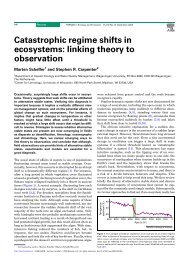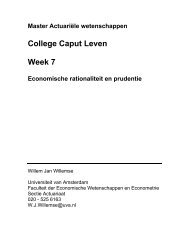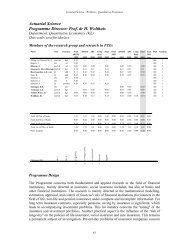How Do Corporate Venture Capitalists Create Value for ...
How Do Corporate Venture Capitalists Create Value for ...
How Do Corporate Venture Capitalists Create Value for ...
Create successful ePaper yourself
Turn your PDF publications into a flip-book with our unique Google optimized e-Paper software.
Overall, our empirical findings indicate that there are two ways in which CVCs uniquely create value<br />
<strong>for</strong> entrepreneurial firms. First, CVC create product market value by investing significant amounts in<br />
younger and riskier firms involving pioneering technologies: since many such firms would not have<br />
received private equity financing from IVCs, these firms may not have been able to grow and mature<br />
without CVC funding. Second, CVCs seem to play an important role in signaling the true value of firms<br />
backed by them to three different constituencies: first, to IVCs, prompting them to co-invest in these firms<br />
pre-IPO; second, to various financial market players such as underwriters, institutional investors, and<br />
analysts, allowing them to access the equity market at an earlier stage in their life-cycle compared to firms<br />
backed by IVCs alone; and third, directly to IPO market investors, allowing CVC-backed firms to obtain<br />
higher market valuation <strong>for</strong> these IPOs (in combination with the increased participation by various<br />
reputable market players) compared to the valuation of firms backed by IVCs alone. In summary, we find<br />
that CVCs create significant value <strong>for</strong> entrepreneurial firms and their shareholders in the above two ways.<br />
The rest of the paper is organized as follows. Section 2 discusses the related literature. Section 3<br />
discusses the data and sample selection. Sections 4 though 8 present our empirical tests and results. We<br />
conclude the paper and discuss the results in Section 9.<br />
2. Related Literature<br />
The empirical literature on corporate venture capital is relatively small. 5 An important paper in this<br />
literature is Gompers and Lerner (2000), who study how the organizational and compensation structure in<br />
CVC-backed firms affect their per<strong>for</strong>mance. 6 They find that CVC-backed firms are more likely to go<br />
public compared to IVC backed firms. Further, they find that this result is particularly strong if there is a<br />
strategic fit between a CVC-parent and the entrepreneurial firm backed by it. Coles, Hertzel, and<br />
Santhanakrishnan (2002) also study the impact of complementarities on the likelihood of a successful exit<br />
5 See Hellman (2002) <strong>for</strong> a theoretical model of corporate venture investing. His model predicts that CVCs will invest in and<br />
provide product market support <strong>for</strong> start-up with greater strategic fit with the CVC’s corporate parent.<br />
6 See also Gompers (2002), who explores a detailed history of corporate venture investments over the part twenty years. He<br />
documents that corporate venture capital investments tend to have higher success rates (in terms going public) than the<br />
investments on independent venture capital firms.<br />
7
















